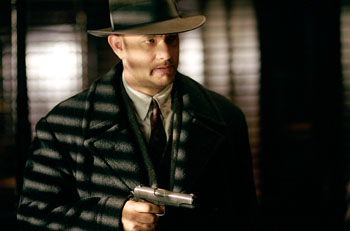![[Metroactive Movies]](/movies/gifs/movies468.gif)
[ Movies Index | Show Times | Silicon Valley | Metroactive Home | Archives ]
Parent Hoods
The morose 'Road to Perdition' stars Tom Hanks as a Depression-era gunman
By Richard von Busack
PAVED WITH good intentions, Road to Perdition is a well-appointed but anhedonic gangster picture that succumbs to DreamWorks' typically Spielbergian focus on father-son bonding. Yes, Conrad L. Hall's photography deserves praise--"beautiful plumage," as the man said, while trying to sell a dead parrot. The opening sequence introduces the full weight of the Depression through Hall's traveling shot of a gigantic redbrick factory as an army of workers starts the day. The sequence places you firmly in the winter of 1931, eliminating the need for any talk in the script about hard times. Still, this morose revenge picture follows the tradition of Miller's Crossing and The Untouchables. It's another gangster film overwhelmed by its own photography and art direction.
Tom Hanks plays Michael Sullivan, a button man for the Irish mob in Rock Island, Ill. Sullivan's captain is also his adopted father--the elderly John Rooney (Paul Newman). But Rooney also has a natural son, a thieving weakling named Connor (Daniel Craig). When Connor strikes against Sullivan's family, the hit man seeks help from Al Capone's chief, Frank Nitti (Stanley Tucci). Nitti, however, withholds his blessing, and Sullivan goes rogue, heading off on a crime spree with his son, Michael Junior (Tyler Hoechlin).
The original Max Allan Collins graphic novel is lively pulp, with plenty of action and colorful superhero nicknames for the gangsters. Originally, O'Sullivan (the "O" has gone missing) was known as "The Angel." In shaping this project for Hanks, the filmmakers have stifled the story with seriousness of purpose; almost every drop of juice has been drained from Collins' creation. Capone himself has been dropped--would he have added too much color to this film? The part of Sullivan has been called a breakthrough for Hanks, but is it? The unflattering mustache and fedora don't conceal the same nice-guy qualities that have made Hanks the first choice for sexless everyman parts. If there's angst in Hanks, he hasn't let it out yet. Every homicide he commits here is justified; he doesn't get any pleasure out of vengeance. As he did in American Beauty, Sam Mendes directs like a social worker on sabbatical, lecturing us about the duties of parents to sacrifice themselves.
Essential to the pleasure of watching a gangster movie is glimpsing the richness and darkness of the characters' lives; watching them, we can dream about what we could have done with ourselves if we'd been tough, ruthless and crafty enough. The only serious scoundrel in Road to Perdition is Jude Law as Maguire, an assassin who poses as a newspaper photographer. The film bestirs itself every time he shows up. If Road to Perdition weren't at heart just another example of the dreaded father/son bonding film, if the plotting were speedy or crooked, or if there were a woman in it--there'd be something to redeem the austerity. Despite the cast and the hype, Road to Perdition is little more than a gloomy, well-photographed fizzle.
[ Silicon Valley | Metroactive Home | Archives ]
![]()

Hanks for the Memories: Conflicted gangster Michael Sullivan (Tom Hanks) inhabits an exquisitely photographed version of the Depression in 'Road to Perdition.'
Road to Perdition (R; 119 min.), directed by Sam Mendes, written by David Self, based on the graphic novel by Max Allan Collins, photographed by Conrad Hall and starring Tom Hanks, Paul Newman and Jude Law, opens Friday at selected theaters valleywide.
Send a letter to the editor about this story
.
From the July 11-17, 2002 issue of Metro, Silicon Valley's Weekly Newspaper.